Jul
26
2009

My friend Matt has been blogging about how postmodernism, with its openness to narrative, is a great opportunity for the gospel. But evangelicals need to sort themselves out first. Otherwise, to the world, they are just a bunch of Patsys. Patsy Biscoes that is.
Continue reading
4 comments | tags: Archaeology, Compromise, Gnosticism, Ideology, James Jordan, Liberal theology, N. T. Wright | posted in Apologetics, Biblical Theology
Jul
25
2009
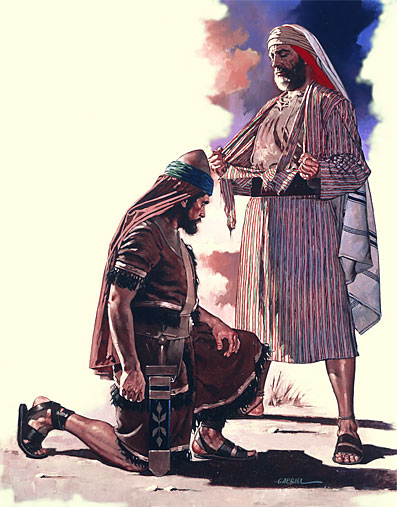
or Worship-styles of the Bitter and Twisted
Under Rehoboam, Solomon’s kingdom became even more like Egypt. Solomon had imposed greater taxes upon his people than were appropriate, and his son Rehoboam took this to the extreme. So the Lord brought about a new Exodus, with Jeroboam as a kind of Moses. David felt guilty for cutting the corner off Saul’s robe — ie. grasping at Saul’s symbol of office — but to Jeroboam the prophet gave ten of the twelve pieces of his robe, the ten northern tribes.
Continue reading
Comments Off | tags: Aaron, David, Egypt, Golden, Jeroboam, Moses, Saul, Solomon | posted in Biblical Theology, Christian Life
Jul
24
2009
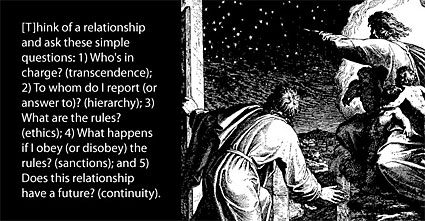 Eric Rauch describes one of the greatest theological discoveries of our time, one which hardly anyone has heard of yet after 20 years.
Eric Rauch describes one of the greatest theological discoveries of our time, one which hardly anyone has heard of yet after 20 years.
by Eric Rauch
One of the enduring Latin phrases of the Protestant Reformation is the impressive sounding ecclesia semper reformans, semper reformanda. In plain English, this means “the church is always reformed and always reforming.” This simple principle is one that is most often forgotten in modern discussions about theology, where a surefire way to end a disagreement is to pull out something written by Luther, Calvin, or even Spurgeon and show that they said much the same thing. Although the Reformers themselves were quite emphatic that they were not the final word (hence the “always reforming”), contemporary Christianity seems to be convinced that dead theologians should be the authoritative standard of interpretation.
Continue reading
Comments Off | tags: Covenant Theology, Ray Sutton, Reformers | posted in Biblical Theology
Jul
24
2009
from Manifesto on Psalms and Hymns
by Douglas Wilson (Introduction to the Cantus Christi Hymnal)

A common practice in our day is for Christians to speak of the “culture wars.” By this they usually mean the political and cultural skirmishes between leftist secular thinking and the more moderate and traditional thinking of believers. But the problem is that the phrase “culture wars” is a particularly inept way to refer to this problem. Continue reading
Comments Off | tags: Culture, Doug Wilson, Liturgy, Modernism, Music, Psalms, Worship | posted in Christian Life, Quotes
Jul
24
2009
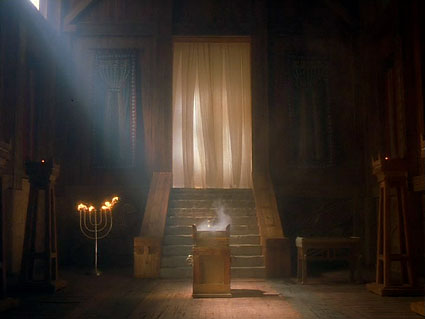
Time for another weird post I think. Here’s some thoughts on Genesis 2:
“This at last is bone of my bones and flesh of my flesh;
she shall be called Woman, because she was taken out of Man.”
Why the change from Adam and Eve to Ish and Isha? Perhaps because the words are symbolic, and symbols describe relationships.[1] There is the possibility that these words were used because they sound like eish (fire), regardless of their differing derivations (the jury is still out on this one after 6000 years). Jordan mentions that Adam was to be an Altar made of earth, and with his own blood shed comes the “fire” of Isha, the woman as the shining on the altar, the glory cloud on Mount Sinai. It certainly corresponds with the feasts. Adam “ascends” to headship over Eve in marriage (Firstfruits), and then he is to “open the Law” to Eve and fill her with light (Pentecost), which he did, but failed to repeat the Law (Trumpets) after she was tested. Atonement followed.
Continue reading
2 comments | tags: AD70, Adam, breastplate, Eve, Feasts, Genesis, Greater Eve, Incense Altar, Lampstand, Man of sin, Scavengers, Tabernacle, Temple | posted in Biblical Theology
Jul
23
2009

Imagine finding a dinosaur alive in your backyard.
Dave Noble found some in the Blue Mountains near Sydney in 1994. This species didn’t die out 200 million years ago after all. A small colony survived. Now you can buy one for your garden. This dinosaur is the Wollemi Pine, the tree that time forgot.
Continue reading
Comments Off | tags: Bible Chronology, Evolution, Fossils | posted in Creation
Jul
22
2009
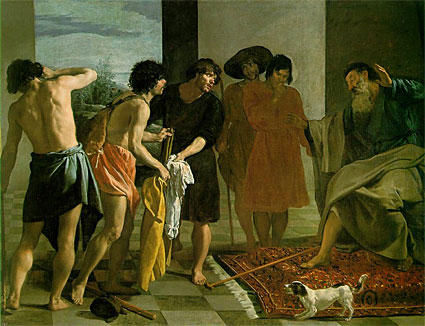
The first ‘cycle’ in the Joseph narrative wasn’t covered in Totus Christus. I have included it in Bible Matrix, and it contains some wonders.
Firstly, Joseph’s first dream (the bowing sheaves) is placed at Firstfruits – Day 3. His second dream (sun moon and stars) is at Pentecost – Day 4.
Secondly, Joseph receives his robe from Jacob at Passover (covering). It symbolises the firmament (Day 2). And his brothers cover it with goat’s blood at Atonement (covering). It symbolises the substitutionary animals and mediatory Man (Day 6). The giving and taking of the robe match chiastically.
Of course, these Scriptures predate the feasts in Leviticus 23.
Comments Off | tags: Atonement, Bible Matrix, Chiasm, Feasts, Firstfruits, Jacob, Joseph, Systematic typology, Veil | posted in Biblical Theology
Jul
21
2009

“I gave the sermon on Hagar and Ishmael today… I began my remarks by pointing out the similarity between the stories of Hagar and Ishmael sent off into the wilderness and Abraham going off with Isaac to sacrifice him, as he believes. My point was that Abraham is in effect called upon to sacrifice both his sons, and that the Lord in both instances sends angels to intervene at the critical moment to save the child. Abraham’s extreme old age is an important element in both stories, not only because he can hardly hope for more children, not only because the children of old age are unspeakably precious, but also, I think, because any father, particularly an old father, must finally give his child up to the wilderness and trust to the providence of God. It seems almost a cruelty for one generation to beget another when parents can secure so little for their children, so little safety, even in the best circumstances. Great faith is required to give the child up, trusting God to honour the parents’ love for him by assuring that there will indeed be angels in that wilderness.
I noted that Abraham himself had been sent into the wilderness, told to leave his father’s house also, that this was the narrative of all generations, and that it is only by the grace of God that we are made instruments of His providence and participants in a fatherhood that is always ultimately His.”
Reverend John Ames, in Gilead by Marilynne Robinson, p. 128-129.
Comments Off | tags: Abraham, Marilynne Robinson, Parenting | posted in Christian Life, Quotes
Jul
21
2009
or Cutting Off the Generations of the Wicked
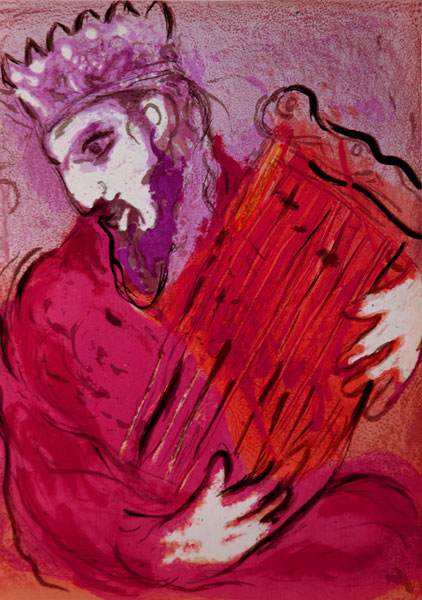
O daughter of Babylon, who are to be destroyed, Happy the one who repays you as you have served us! Happy the one who takes and dashes your little ones against the rock!
(Psalm 137:8-9)
A further comment on Psalm 137 (following Church and State and Liturgy as Prophecy):
The church has the power to excommunicate, but the state alone has the power to execute. In Joshua’s and David’s time, church and state were one, thus Israel’s army slaughtered God’s enemies judicially. In Mordecai’s time, the slaughter of Haman’s followers by the Jews occurred only after church and state became one under Mordecai’s new executive power.
You must be logged in to see the rest of this post.
Join now for a year for $15!
As an advisor to the state, the church gives the word, and offers the sacraments, but it is always the state that carries out the judgment — government. The state is the “outer court” into which the living sword-water flows. Some taste life and others taste death. [1]
Continue reading
Comments Off | tags: AD70, Babylon, Joshua, Mordecai, Nebuchadnezzar, Psalms, Zedekiah | posted in Biblical Theology, The Last Days, The Restoration Era, Totus Christus
Jul
21
2009
“When you drink wine [at Communion] you are volunteering for death; you are accepting martyrdom.”
– James Jordan, Worship Lectures 2009
Comments Off | tags: Communion, James Jordan | posted in Quotes


































